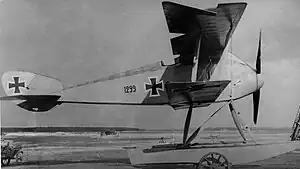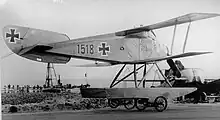LTG FD 1
The LTG FD 1 was a single-seat floatplane fighter built for the Imperial German Navy's (Kaiserliche Marine) Naval Air Service (Marine-Fliegerabteilung) by Luft Torpedo Gesellschaft (LTG) during World War I. Only six prototypes were built in 1917–1918 and are not known to have served on active duty.
| LTG FD 1 | |
|---|---|
 | |
| Side view of the first prototype | |
| Role | Floatplane fighter |
| National origin | Germany |
| Manufacturer | Luft Torpedo Gesellschaft |
| First flight | 1917 |
| Status | Prototype |
| Primary user | Imperial German Navy |
| Number built | 6 |
Development and description
LTG (Aerial Torpedo Company) was founded in early 1915 to develop air-launched torpedoes and gradually expanded into sub-contracting aircraft components. It received an order for three prototypes (Marine numbers 1299–1301) for a floatplane fighter on 8 February 1917. The first airframe for static testing was delivered three months later and was destroyed during the process. The next aircraft was delivered in July; flight testing showed that it was not very maneuverable and lacked longitudinal stability so the third prototype was returned to the factory on 7 September. Another batch of three prototypes (Marine numbers 1518–1520) had been ordered when the aircraft passed its static testing in May, but enlarging the vertical stabilizer and making the other necessary changes delayed deliveries until the following year. They were still undergoing testing when the war ended in November 1918. All five surviving aircraft were in storage at Hage where the Allies found them in December.[1]

Specifications
Data from German Seaplanes of WWI: Sablatnig, Kaiserliche Werften, Lübeck-Travemünde, LTG, & Oertz: A Centennial Perspective on Great War Airplanes[2]
General characteristics
- Crew: 1
- Length: 9.0 m (29 ft 6 in)
- Wingspan: 10.0 m (32 ft 10 in)
- Height: 3.55 m (11 ft 8 in)
- Empty weight: 895 kg (1,973 lb)
- Gross weight: 1,165 kg (2,568 lb)
- Powerplant: 1 × Benz Bz.III , 110 kW (150 hp) Originally measured as 150 PS (110 kW)
Performance
- Maximum speed: 145 km/h (90 mph, 78 kn)
- Time to altitude: 1,000 m (3,300 ft) in 4 minutes 30 seconds
Notes
- Herris, pp. 70–72
- Herris, p. 72
References
- Gray, Peter & Thetford, Owen (1987) [1970]. German Aircraft of the First World War (2nd ed.). London: Putnam. ISBN 0-85177-809-7.
- Green, William & Swanborough, Gordon (2001) [1994]. The Complete Book of Fighters: An Illustrated Encyclopedia of Every Fighter Built and Flown (Revised and Updated ed.). London: Salamander Books. ISBN 1-84065-269-1.
- Herris, Jack (2015). German Seaplanes of WWI: Sablatnig, Kaiserliche Werften, Lübeck-Travemünde, LTG, & Oertz: A Centennial Perspective on Great War Seaplanes. Great War Aviation Centennial Series. Vol. 15. n.p.: Aeronaut Books. ISBN 978-1-935881-27-8.
Further reading
- Kroschel, Günter; Helmut Stützer (1994). Die Deutschen Militärflugzeuge 1910–1918. Herford: Verlag E.S. Mittler & Sohn.
- Nowarra, Heinz J. (1966). Marine Aircraft of the 1914–1918 War. Letchworth, Harts: Harleyford Publications.
- Taylor, Michael J. H. (1989). Jane's Encyclopedia of Aviation. London: Studio Editions.